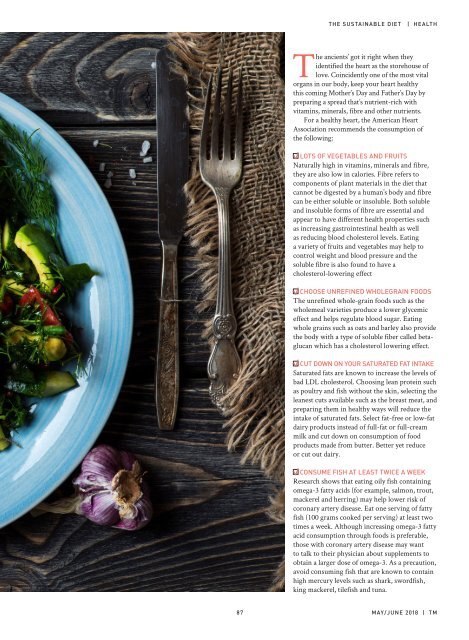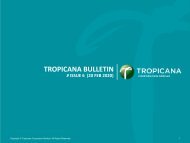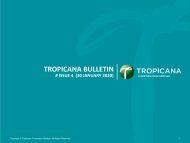Tropicana Magazine May-Jun 2018 #118: Winner Takes All
Issue.#118 (Winner Takes All) Nu Infinity shares their origin stories on forming their own dream team. A guide to exotic Istanbul, Major golf tournaments and more.
Issue.#118 (Winner Takes All) Nu Infinity shares their origin stories on forming their own dream team. A guide to exotic Istanbul, Major golf tournaments and more.
Create successful ePaper yourself
Turn your PDF publications into a flip-book with our unique Google optimized e-Paper software.
THE SUSTAINABLE DIET<br />
| HEALTH<br />
The ancients’ got it right when they<br />
identified the heart as the storehouse of<br />
love. Coincidently one of the most vital<br />
organs in our body, keep your heart healthy<br />
this coming Mother’s Day and Father’s Day by<br />
preparing a spread that’s nutrient-rich with<br />
vitamins, minerals, fibre and other nutrients.<br />
For a healthy heart, the American Heart<br />
Association recommends the consumption of<br />
the following:<br />
LOTS OF VEGETABLES AND FRUITS<br />
Naturally high in vitamins, minerals and fibre,<br />
they are also low in calories. Fibre refers to<br />
components of plant materials in the diet that<br />
cannot be digested by a human’s body and fibre<br />
can be either soluble or insoluble. Both soluble<br />
and insoluble forms of fibre are essential and<br />
appear to have different health properties such<br />
as increasing gastrointestinal health as well<br />
as reducing blood cholesterol levels. Eating<br />
a variety of fruits and vegetables may help to<br />
control weight and blood pressure and the<br />
soluble fibre is also found to have a<br />
cholesterol-lowering effect<br />
CHOOSE UNREFINED WHOLEGRAIN FOODS<br />
The unrefined whole-grain foods such as the<br />
wholemeal varieties produce a lower glycemic<br />
effect and helps regulate blood sugar. Eating<br />
whole grains such as oats and barley also provide<br />
the body with a type of soluble fiber called betaglucan<br />
which has a cholesterol lowering effect.<br />
CUT DOWN ON YOUR SATURATED FAT INTAKE<br />
Saturated fats are known to increase the levels of<br />
bad LDL cholesterol. Choosing lean protein such<br />
as poultry and fish without the skin, selecting the<br />
leanest cuts available such as the breast meat, and<br />
preparing them in healthy ways will reduce the<br />
intake of saturated fats. Select fat-free or low-fat<br />
dairy products instead of full-fat or full-cream<br />
milk and cut down on consumption of food<br />
products made from butter. Better yet reduce<br />
or cut out dairy.<br />
CONSUME FISH AT LEAST TWICE A WEEK<br />
Research shows that eating oily fish containing<br />
omega-3 fatty acids (for example, salmon, trout,<br />
mackerel and herring) may help lower risk of<br />
coronary artery disease. Eat one serving of fatty<br />
fish (100 grams cooked per serving) at least two<br />
times a week. Although increasing omega-3 fatty<br />
acid consumption through foods is preferable,<br />
those with coronary artery disease may want<br />
to talk to their physician about supplements to<br />
obtain a larger dose of omega-3. As a precaution,<br />
avoid consuming fish that are known to contain<br />
high mercury levels such as shark, swordfish,<br />
king mackerel, tilefish and tuna.<br />
87 MAY/JUNE <strong>2018</strong> | TM


















